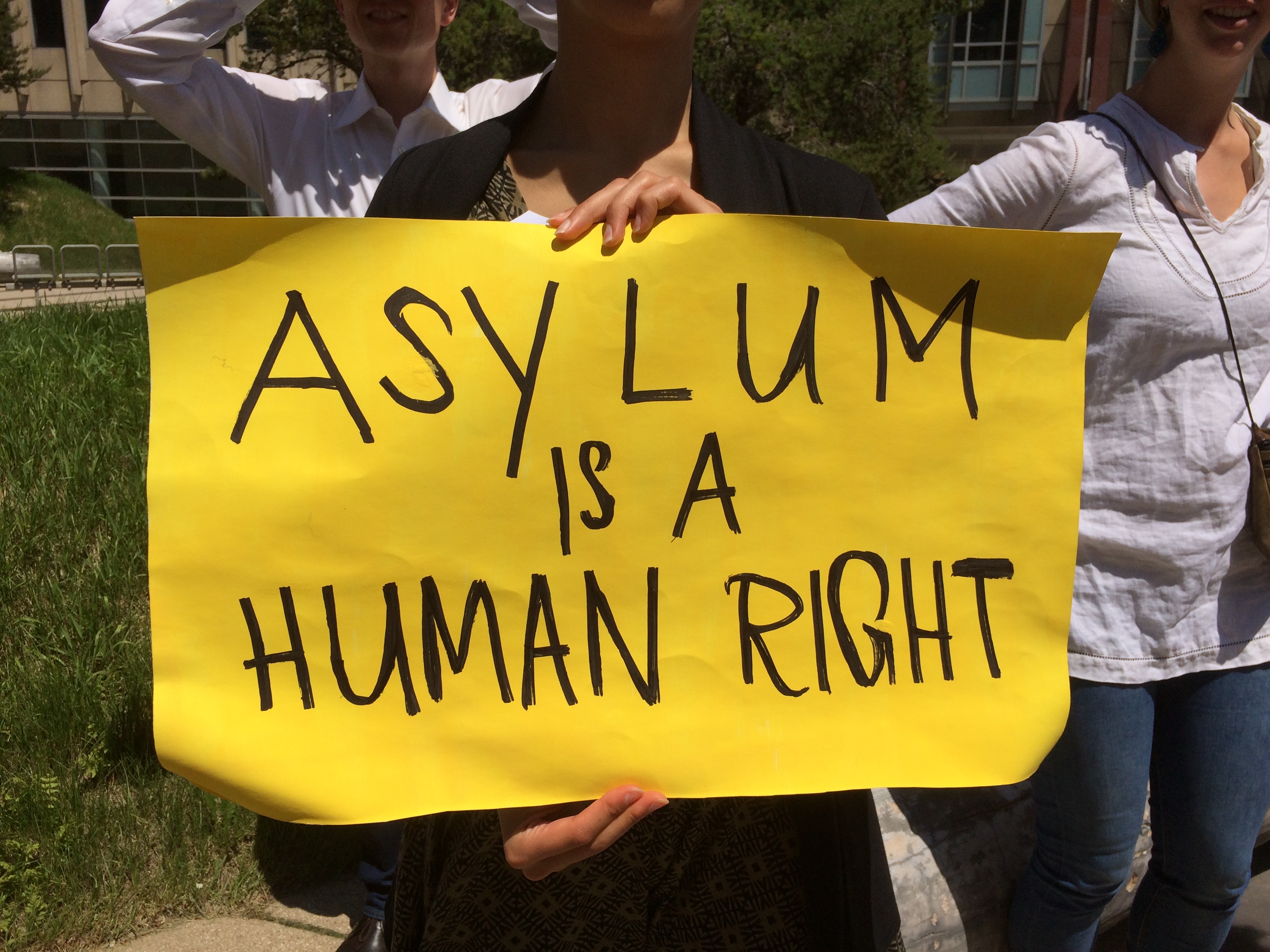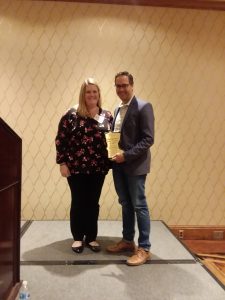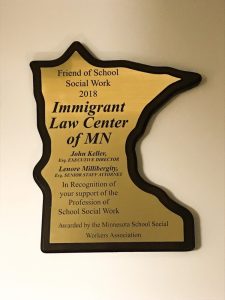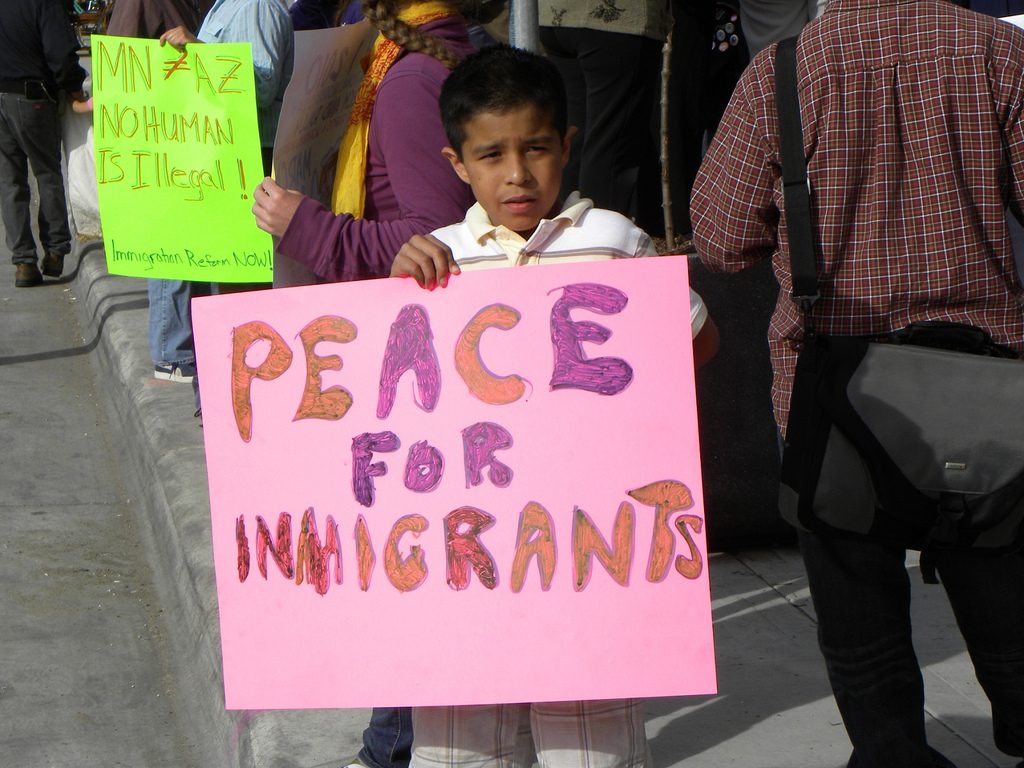Trump’s plan raises the risk of summary deportation for thousands of asylum seekers — if it’s allowed to move forward.
Archives
Protecting Asylum and the Rule of Law
 November 9, 2018—Today the president issued an emergency proclamation that unabashedly violates the clear law of the land and our international human rights obligations, and betrays our national values and commitment to offer safe haven to those who come to the United States seeking to escape violence and persecution.
November 9, 2018—Today the president issued an emergency proclamation that unabashedly violates the clear law of the land and our international human rights obligations, and betrays our national values and commitment to offer safe haven to those who come to the United States seeking to escape violence and persecution.
Asylum seekers are clearly protected under U.S. and international law. Any person may make claims for asylum whether or not they have entered through border checkpoints:
“Any alien who is physically present in the United States or who arrives in the United States (whether or not at a designated port of arrival…), irrespective of such alien’s status, may apply for asylum in accordance with this section…” 8 U.S.C. §1158(a)(1) [emphasis added]
In contravention of this clear language, today the president has ordered that anyone who enters the United States outside a designated border checkpoint will not be allowed to apply for asylum. In support of this illegal proclamation, he claims a national emergency, based on an increase in the number of Central American families and children seeking asylum. Absent from his rationale is the reality that the increase of Central American migrants is due to crisis levels of violence in Honduras, El Salvador, and Guatemala, and to the utter failure of those governments to protect their most vulnerable citizens.
In desperation, mothers and fathers risk everything, including the lives of their children, as they walk more than a thousand grueling miles seeking safety. Along their route, people in Mexico have greeted these hungry and footsore refugees with food and bandages and compassion.
The response of the United States government has been to shut down access to legal border crossing points to all but a trickle of applicants, leaving others sleeping on sidewalks and bridges, waiting for a chance to apply. Further, this administration just a few months ago took the unprecedented step of intentionally separating children from their parents, some still remaining separated to this day, in a cynical attempt to discourage future migration. The former Attorney General has also unilaterally restricted asylum claims that will even be considered. Now the president recklessly and autocratically seeks to discard U.S. asylum law and the values embodied in the United States as a champion of human rights, defender of the democratic rule of law, and place of refuge for the persecuted. .
“This action cannot and will not be allowed to stand,” said John Keller, executive director of the Immigrant Law Center of Minnesota. “The United States is a nation governed by laws, not by presidential prejudice or whim. The United States is an idea and promise of fairness and freedom, when we are at our best. We are strongest when our laws reflect the promise of equal access to the law, protection and opportunity for all that seek to call the United States home. We are strongest when we act out of compassion, justice and equality. Like the good people of Mexico, the everyday people of the United States and Minnesota, given the chance, have welcomed their immigrant brothers and sisters, bound up their wounds and helped heal their trauma, offered shelter and a seat in their churches, synagogues and mosques, and given thanks for the richness, strength and energy that they and their families bring to our country and state.
“The president’s latest illegal, anti-immigrant action will be challenged in court. We will not give up the values of the United States, the commitment to this nation of laws and checks and balances, and our obligation to respect human rights and human dignity.”
Changes to Public Charge Rule: Background (Last updated 11/8/2018)
This document was last updated in November, 2018. For current background information on public charge, click here.
On October 10, the Trump administration introduced an administrative rule change that seeks to limit the number of people allowed to obtain immigration benefits or enter the United States based on their health, age, and financial resources. The proposed rule change, “Inadmissibility on Public Charge Grounds,” which will take effect after the government considers comments it receives during a 60-day public comment period, will be the most radical change to immigration law and the use of public benefits by immigrants in 22 years. If enacted, the rule will have a devastating impact on low-income and working-class immigrant families and their US citizen children, many of whom will face the difficult choice between jeopardizing their family’s immigration status or refusing assistance to ensure their children’s food, housing, and medical care.
Click here for information on how you can say something about this change.
Click here for much more information and a list of documents relating to public charge regulation.
The “public charge” rule has had a narrow application. Currently, the government can deny immigration status to persons who it deems may become dependent on three cash-based assistance programs: TANF, SSI or long-term institutional care such as Medicaid coverage for nursing home care.
The current public charge test affects approximately 3 percent of family-based visa and green card applicants. The new proposal would widen the scope of eligible public assistance programs to include many more forms of public assistance and would give government officials wide discretion with little accountability on how to apply the test. The Department of Homeland Security estimates that the new rule change will affect approximately 382,000 family-based immigrants per year.
In 1999, the Immigration Service clarified that only a few cash-based public assistance programs could lead to a finding of public charge. Now, the Trump administration has published its proposed rule change prior to the mid-term elections to support the false narrative that immigrants rely on public assistance more than native-born citizens. That is not true. This attempt at garnering electoral support from anti-immigrant rhetoric, will have real, devastating and long-lasting consequences for immigrant families, and for all of us, long after the election is over. Among the direct consequences:
- The proposed rule change will undermine public health. The proposed changes, which attempt to punish immigrants, will affect entire families, including U.S. citizen children. If a mother refuses to sign her family up (or un-enrolls) for SNAP (food stamps) because she fears that benefit use will harm her or a relative’s immigration prospects in the future, her whole family will suffer. Health care advocates report that immigrants already are withdrawing from crucial programs such as SNAP and WIC (one of the programs listed in earlier versions of the proposed rule change). This chilling effect puts children at risk for low birth weight and other health problems.
- The proposed rule will limit family-based immigration. Spouses, parents, and children of U.S. citizens, as well as legal permanent residents, may be refused visas if they cannot show relatively high income and good health. Many immigrants from Mexico, China, the Philippines and the Dominican Republic, the countries sending the largest number of family immigrants to the United States may not be able to pass public charge scrutiny under the new rule.
- While the new rule does not directly impact the green card applications for refugees, asylees, survivors of domestic violence and other protected groups, it may diminish their chances of filing family-based petitions in the future to reunite with family members still waiting in other countries.
- Short-term public assistance benefits help stabilize immigrant families putting them on track for long-term financial stability.
Below is the full list of public benefits included and not included in the new proposal.
Receipt of Cash Benefits Included in the public charge assessment:
- Temporary Assistance for Needy Families (TANF)
- Supplemental Security Income (SSI)
- State and local cash assistance programs that provide benefits for income maintenance
- Programs supporting individuals who are institutionalized for long-term care
Receipt of Non-Cash Benefits Included in the public charge assessment:
- Medicaid (except for emergency Medicaid and certain disability services related to education)
- Medicare Part D Low Income Subsidy
- Supplemental Nutrition Assistance Program (SNAP, formerly known as food stamps)
- Section 8 Housing Choice Voucher Program
- Section 8 Project-Based Rental Assistance, and
- Public Housing
Public Benefits not included (but previously rumored to be included) in the public charge assessment:
- Emergency Medical Assistance
- Disaster Relief
- National school lunch or school breakfast programs
- Foster care and adoption
- Head Start
- Child Health Insurance Program (CHIP or SCHIP) (not included now, but under consideration for the future)
- Earned Income Tax Credit or Child Tax Credit
- Subsidized Health Insurance Under the Affordable Care Act
- Special Supplemental Nutrition Program for Women, Infants and Children (WIC)
- Housing Assistance, or
- Energy Benefits
This regulation is aimed at anyone applying for legal permanent resident (green card) status in the U.S. as well as those seeking family-based immigrant visas abroad.
Click here for information on how you can say something about this change.
Click here for much more information and a list of documents relating to public charge regulation.
Trump administration tightens immigration asylum rules as caravans continue to push for U.S. border
The Trump administration introduced new measures Thursday to deny asylum to migrants who enter the country illegally, invoking national security powers to curb long-standing humanitarian protections for foreigners arriving on American soil.
‘Dreamers’ Win Round in Legal Battle to Keep DACA
A federal appeals court on Thursday upheld a nationwide injunction against the Trump administration’s attempt to revoke DACA.
Rosario: Reliving by proxy that first-time feeling at the voting booth
ILCM Honored with Friend of School Social Work 2018 Award
 On October 29, the Immigrant Law Center of Minnesota (ILCM) was honored by the Minnesota School Social Workers Association (MSSWA) as this year’s Friend of School of Social Work. The award was given in recognition of ILCM’s support of the profession of school social work through immigration legal services and advocacy.
On October 29, the Immigrant Law Center of Minnesota (ILCM) was honored by the Minnesota School Social Workers Association (MSSWA) as this year’s Friend of School of Social Work. The award was given in recognition of ILCM’s support of the profession of school social work through immigration legal services and advocacy.
MSSWA is a state-wide organization committed to the improvement of the school social work profession and to the well-being of children and their families. with immigrant children and families, school social workers witness how recent immigration policy changes have affected these families. They believe in supporting and protecting all children, regardless of citizenship status.
MSSWA Legislative Chair and Secretary Christy McCoy said,
“We are excited to honor all the staff of the Immigrant Law Center of MN for all of the advocacy efforts, support and unwavering commitment to the young people and families that we share. As School Social Workers, we have appreciated the resources, professional development opportunities and advocacy that the Immigrant Law Center has provided for many years.” 
ILCM provides legal services to some of MSSWA’s clients and assists MSSWA in their state and national advocacy work. At MSSWA’s 15th Annual Day at the Hill conference, Lenore Millibergity, ILCM senior staff attorney, presented as the keynote speaker. In her speech, she advocated on behalf of Dreamers and advised MSSWA members on how to work with undocumented youth and their families.
Migrant Caravan: Answers to Your Most Pressing Questions
Beyond the rhetoric: facts on the caravan, its beginnings, people, reasons for heading north, and more.
Bandaged Feet, Bleeding Hands, Violent Coughs: The Caravan Takes Its Toll
Report from Mexico: what the caravan looks like every day.
Renounce Hatred, Build Together
October 29, 2018—The terrible attack on the Tree of Life synagogue in Pittsburgh was motivated by anti-Semitism and by anti-immigrant bigotry. We mourn the lives lost to hatred and denounce the political rhetoric that feeds and fuels that hatred.
In the past week, we have seen
- the attack on Tree of Life that killed 11 people;
- the shooting of two African Americans in a Kroger store in Kentucky after that gunman tried and failed to gain entry to a First Baptist Church in Jeffersontown with the intent to kill African Americans;
- pipe bombs sent to media and Democratic politicians.
The man who killed 11 people in the Tree of Life synagogue posted hateful rants on social media attacking the Hebrew Immigrant Aid Society (HIAS), which has aided immigrants and refugees in this country for more than a century. We share HIAS’s belief that immigrants and refugees are a gift to this country, to be welcomed rather than feared. The threat of terrorism in our country comes from bigots and right-wing extremists, not from immigrants and refugees.
“These awful acts of violence are not random,” said ILCM Executive Director John Keller. “They are connected by bigotry and hatred. They are incited and supported by political rhetoric used to create a climate of hate and fear that endangers not only its targets, but our democracy itself.
“We call on all people who care about this country to renounce hatred, to renounce bigotry, and to engage in civil, fact-based discourse that can connect us in a common effort to build a strong and welcoming United States.”





